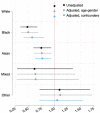Worse outcomes linked to ethnicity for early inflammatory arthritis in England and Wales: a national cohort study
- PMID: 35536178
- PMCID: PMC9788810
- DOI: 10.1093/rheumatology/keac266
Worse outcomes linked to ethnicity for early inflammatory arthritis in England and Wales: a national cohort study
Abstract
Objective: To assess variability in care quality and treatment outcomes across ethnicities in early inflammatory arthritis (EIA).
Methods: We conducted an observational cohort study in England and Wales from May 2018 to March 2020, including patients with a suspected/confirmed EIA diagnosis. Care quality was assessed against six metrics defined by national guidelines. Clinical outcomes were measured using DAS28. Outcomes between ethnic groups ('White', 'Black', 'Asian', 'Mixed', 'Other') were compared, and adjusted for confounders.
Results: A total of 35 807 eligible patients were analysed. Of those, 30 643 (85.6%) were White and 5164 (14.6%) were from ethnic minorities: 1035 (2.8%) Black; 2617 (7.3%) Asian; 238 (0.6%) Mixed; 1274 (3.5%) Other. In total, 12 955 patients had confirmed EIA, of whom 11 315 were White and 1640 were from ethnic minorities: 314 (2.4%) Black; 927 (7.1%) Asian; 70 (0.5%) Mixed; 329 (2.5%) Other. A total of 14 803 patients were assessed by rheumatology within three weeks, and 5642 started treatment within six weeks of referral. There were no significant differences by ethnicity. Ethnic minority patients had lower odds of disease remission at three months [adjusted odds ratio 0.79 (95% CI: 0.65, 0.96)] relative to White patients. Ethnic minorities were significantly less likely to receive initial treatment withMTX[0.68 (0.52, 0.90)] or with glucocorticoids [0.63 (0.49, 0.80)].
Conclusion: We demonstrate that some ethnic minorities are less likely to achieve disease remission in three months following EIA diagnosis. This is not explained by delays in referral or time to treatment. Our data highlight the need for investigation into the possible drivers of these inequitable outcomes and reappraisal of EIA management pathways.
Keywords: Asian; Black; DAS28; DMARD; Mixed; Other; care quality; disease outcome; early inflammatory arthritis; ethnic minorities.
© The Author(s) 2022. Published by Oxford University Press on behalf of the British Society for Rheumatology.
Figures



Comment in
-
Health inequalities across patients with early inflammatory arthritis of different ethnicities: what could be the driving factors?Rheumatology (Oxford). 2022 Dec 23;62(1):7-8. doi: 10.1093/rheumatology/keac383. Rheumatology (Oxford). 2022. PMID: 35786709 No abstract available.
References
Publication types
MeSH terms
LinkOut - more resources
Full Text Sources
Medical

